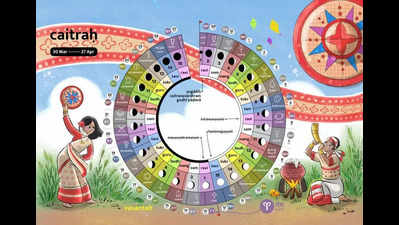Bengaluru: Have you ever wondered why festival dates seem to shift every year? Or why traditional Indian calendars, with their dense text and unfamiliar symbols, remain tucked away behind doors, rarely consulted? The answer lies in the Indian lunisolar calendar — Vikram Samvat — which determines festival dates based on celestial movements rather than fixed Gregorian months.
To bridge this gap, Neel, co-founder of Coolture Designs, has decided to give the Indian calendar a contemporary twist. “One common question children ask is why Hindu festivals ‘move’ through the year. The truth is, they don’t. The Indian calendar follows the moon’s cycle, aligning with cosmic events. Ganesh Chaturthi will always occur on a particular Chaturthi, just as Ugadi aligns with Chaitra Shukla Pratipada. This new approach encourages people to see time from an Indian perspective,” he said.
This realisation led to the creation of Parva Darshini, a calendar that integrates Tithi, Vara, and Nakshatra in a way that is easy to grasp. “The Indian calendar is a fascinating blend of astronomy and mathematics. Yet, most people today see it as ‘old-fashioned’ without understanding its deep logic. There’s a generational disconnect; we’ve stopped passing down this knowledge,” he explained.
Coolture Designs has reimagined the Panchanga visually, making it more accessible. Unlike the tabular format used to illustrate a month in the Gregorian calendar, Parva Darshini uses the circular format with concentric circles linking the weekdays to Gregorian dates and Nakshatras (lunar mansions).
Instead of simply listing Gregorian dates with tiny annotations, this redesigned calendar highlights core Indian timekeeping elements: Paksha (lunar phase), Tithi (lunar day), Vara (weekday), and Nakshatra. Festivals are presented in their traditional context; for instance, Vasanta Panchami, Ratha Saptami, and Ganesh Chaturthi are tied to specific lunar days, not arbitrary dates. “By focusing solely on Gregorian dates, we lose the true significance of these events,” Neel pointed out.
Western disconnect
Vishwanath Guha, a scholar and calendar expert, further elaborated: “We often talk about festivals using western dates, saying, for example, ‘Ugadi falls on March 30′. But this is like translating our mother tongue into English; it creates a disconnect. The real reference is Chaitra Shukla Pratipada. This is the language of our timekeeping.”
He highlighted the problem with traditional Panchangas: They are purchased, placed in prayer rooms, and seldom used because most people don’t know how to read them. “If we want to rekindle interest, we must represent it visually. Rather than saying ‘today is Ugadi,’ we now recognise that ‘Chaitra Shukla Pratipada is Ugadi’. It fosters a deeper connection with our heritage.”
The biggest design challenge was structuring the calendar while preserving its astronomical accuracy. Initially, the team struggled with representing Nakshatras, which are fixed in the sky, while maintaining the daily cycle. “Then we had a breakthrough — we used the Vara (weekday) as the anchor, keeping it constant while mapping celestial changes around it,” Guha explained.
Unlike traditional Panchangas, which are large and complex, this version is compact and user-friendly. “We are not replacing the Panchanga but offering a new way to appreciate it,” Guha clarified. “By making time visually intuitive, we hope to spark curiosity, especially among younger generations. If people start seeing the connections between the cosmos and our festivals, we consider this a success.”


